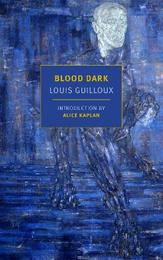
|
Blood Dark
Paperback / softback
Main Details
| Title |
Blood Dark
|
| Authors and Contributors |
By (author) Alice Kaplan
|
|
By (author) Louis Guilloux
|
|
By (author) Peter Bush
|
| Physical Properties |
| Format:Paperback / softback | | Pages:592 | | Dimensions(mm): Height 203,Width 128 |
|
| ISBN/Barcode |
9781681371450
|
| Classifications | Dewey:843.912 |
|---|
| Audience | |
|---|
| Edition |
Main
|
|
Publishing Details |
| Publisher |
The New York Review of Books, Inc
|
| Imprint |
The New York Review of Books, Inc
|
| Publication Date |
17 October 2017 |
| Publication Country |
United States
|
Description
Louis Guilloux's novel Blood Dark tells the story of a brilliant and provocative philosopher trapped in a provincial town and of his spiraling descent into self-destruction. Cripure, as his students call him, the name a mocking contraction of The Critique of Pure Reason, despises his colleagues and despairs of his charges and is at odds with his family. The year is 1917, and the First World War continues its relentless course, with French soldiers not only dying by the tens of thousands but also beginning to desert in protest. Cripure, having seen student after student go to his death, finds himself literally up in arms at the complacent patriotism of his fellow teachers as he challenges one of them to a duel. Unfolding over the course of a single day, Blood Dark describes both how Cripure manages to embroil himself in this from this ridiculous "Affair of honor," from which his few friends are helpless to rescue him, even as soldiers riot at the train station, and the mayor gobbles down pastries to avoid delivering death notices. Guilloux's novel, an important inspiration to the young Albert Camus, is an unflinching attack on the hypocritical pieties of a middle-class society and a tragic portrait of a man at war with the world and himself.
Author Biography
Louis Guilloux (1899-1980) worked as a left-wing organizer, a literary translator, and an interpreter for the American army in France. Laura Marris is a writer, translator, and Lecturer in Creative Writing at Boston University. Alice Kaplan is the author of The Collaborator: The Trial and Execution of Robert Brasillach, which was a finalist for the National Book Award. She is John M. Musser Professor of French at Yale University.
Reviews"Laura Marris's disarmingly colloquial translation-the first in English since 1936, when the book was titled Bitter Victory-makes accessible a novel that chronicles, as though in real time, the transformations the catastrophe of World War I wrought on European civilization. It's a masterwork that in France is spoken of in the same breath as Celine's Journey to the End of the Night and Sartre's Nausea....there is a revelatory sense reading Guilloux's novel that one has found a key text linking the sparkling contempt of Flaubert to the tender resignation of Camus." -Sam Sacks, The Wall Street Journal "Guilloux's work deserves to be better known in the anglophone world; it's good news that this major novel has resurfaced in Laura Marris's attentive and accomplished translation." -Adrian Tahourdin, Times Literary Supplement "Considered a masterpiece by Gide, Malraux, Camus, and Pasternak, Guilloux's 1935 Blood Dark remains the least known in English of France's twentieth-century blockbuster novels. Guilloux breaks with the tidiness of traditional French fiction to provide a hallucinatory-and tragicomic-vision of a single day in the life (and death) of a small port town in Brittany during the mutinous and revolutionary year of 1917. At the heart of this apocalyptic satire lies the outsize figure of Cripure, a nihilistic highschool teacher of philosophy, a monstrous Ahab of the intellect suicidally in quest of his Nietzschean white whale. Guilloux's Le Sang noir here emerges afresh-and urgent-in this new translation by Laura Marris." -Richard Sieburth "We come upon Blood Dark with something of a shock. For here is a novel projected in the grand style of the nineteenth century, a mountain of a novel, sprawling . . . out of which there emerges a great tragic figure." -Harold Strauss, The New York Times
|